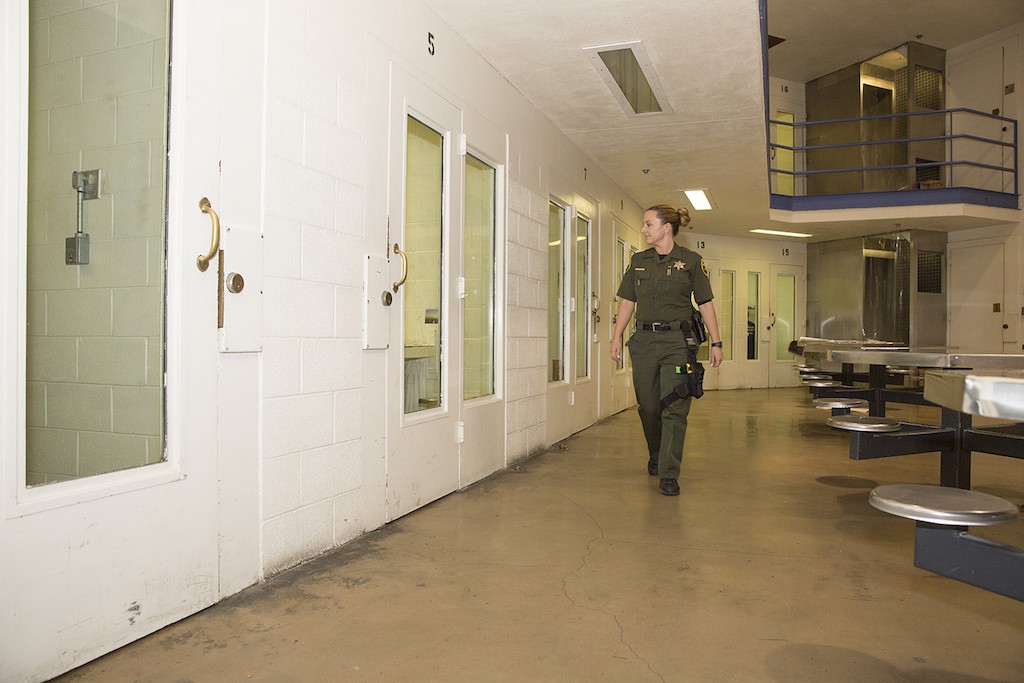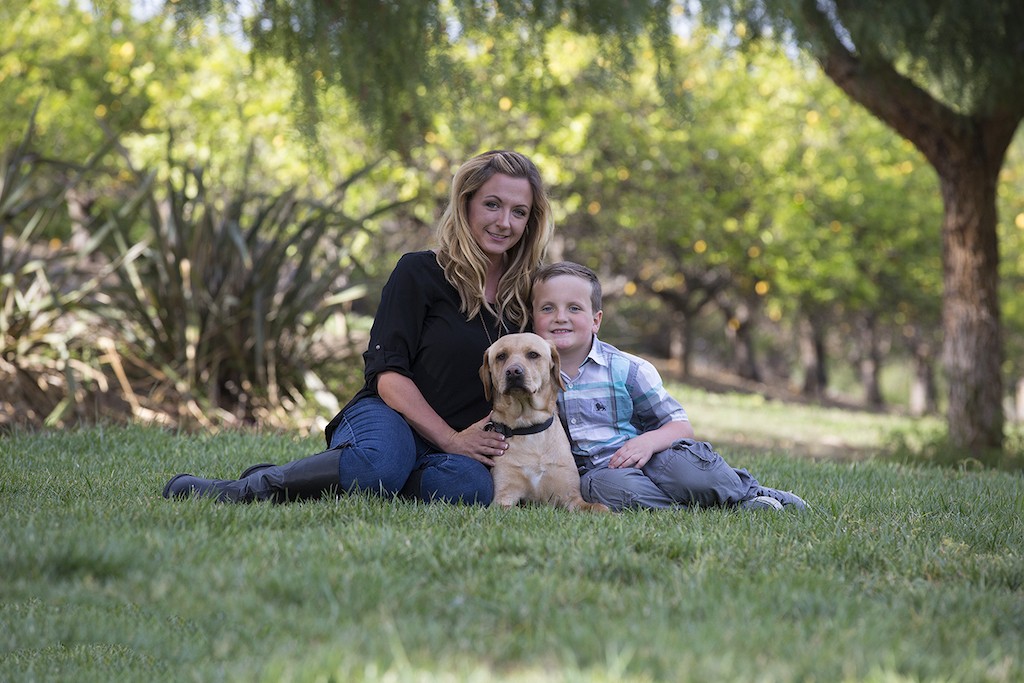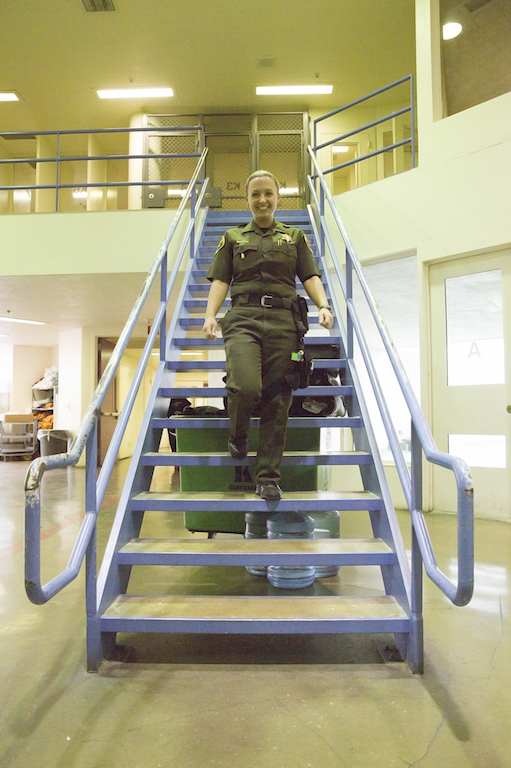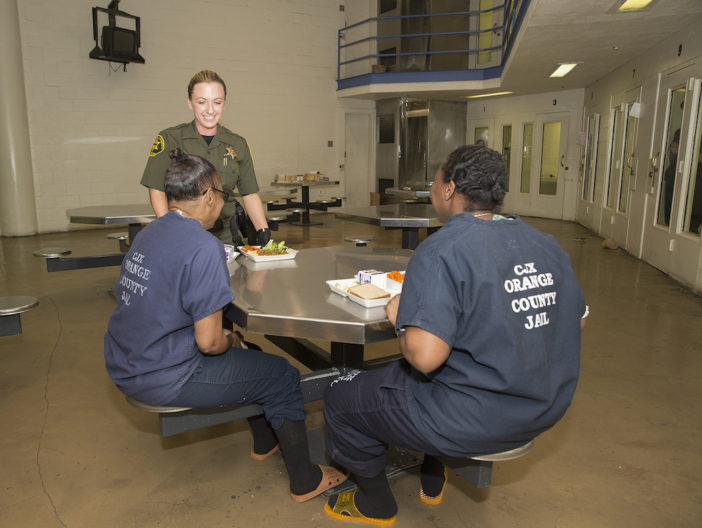The woman with the sallow skin and fire-red hair walked up to the window.
Her eyes pointed toward the floor, lips drawn into a severe frown. She asked the deputy behind the window if she could have some food.
“I’m diabetic,” she explained in a weak voice. “I haven’t eaten in a while.”
The male deputy spoke kindly and told her he’d help.
The woman nodded, then returned her eyes to the floor as the deputy went on with a series of routine questions.
Do you use drugs? Are you detoxing?
“Yes,” the woman answered.
Have you attempted suicide? How many times?
“Yes. Five,” she replied, still looking down.
Do you have any reason to fear for your safety? Are you affiliated with any known terrorism or extremist groups.
“No.”
The woman had been to the Orange County Sheriff’s Department Intake Release Center, so she knew the drill.
“Hey, does anyone ever say you look like the Little Mermaid?” a bubbly female voice chimed in from behind the plexiglass.
The woman with the fire-red hair looked up, a quizzical stare settled across her face.
“Some people say I look like Ariel,” she said. “The color on the box said it was dark red and this is what I ended up with.”
The female voice responded: “You need to get a gold base in there. That will make the color hold better.”
The woman — arrested earlier that day on drug charges — smiled.
It doesn’t matter what an inmate is in for, Orange County Sheriff’s Deputy Sarah Pavuk talks to everyone as if she’s known them for years.
“Everyone has a story,” she said. “Everyone has had struggles. I just love talking to people.”

Orange County Sheriff Deputy Sarah Pavuk makes her rounds in housing at the Intake Release Center in Santa Ana. Photo courtesy the Orange County Sheriff’s Department.
She traded jokes with a meth addict, then pushed for answers on why a known prostitute who recently had a child continues to end up back in handcuffs.
Pavuk pokes fun, she listens, she challenges.
The 5-foot-2 deputy has a gift.
“I just love to know people’s stories,” she said. “I want to know, why are they using that drug? What do they need it for? Do they need it to go to work like I need my coffee? What in their life brought them here?”
The 29-year-old single mother could have been someone who ended up in such a life, so it intrigues her.
The risk factors were there: Pavuk was raised in a rough neighborhood in Norwalk by a hardworking single mother.
Her father was out of the picture after he decided to devote his life to a drug habit rather than his family.
It would have been easy to venture down a path of rebellion and anger, but Pavuk didn’t.
She instead ended up a deputy working at the IRC — a place where Orange County’s most dangerous criminals pass through, where lower-level offenders might spend some time and where she witnesses the bizarre every day.
And she loves it.
…
Pavuk has always gravitated toward jobs that put her in front of people.
It’s why she made a great hair dresser when she graduated high school and why she loved working for several years as a bartender at the Montage in Laguna Beach.
But after becoming a mom, Pavuk wanted more, and in 2012 became an OCSD dispatcher at the encouragement of a family member.
It didn’t take much time manning the radio before Pavuk decided a career in the field was more fitting for her.
“I wanted to be hands on,” she said. “I wanted to see the people I could make an impact on.”
It wasn’t easy.
A single mom with a nearly 4-year-old son at the time, Pavuk had to get creative to make it through the grueling 26-week Orange County Sheriff’s Regional Training Academy.

OCSD Deputy Sarah Pavuk has worked for the department for the last four years — two as a dispatcher and two as a deputy. Photo courtesy the Orange County Sheriff’s Department.
She heard other recruits talk about how family members packed lunches or readied their uniforms for the following morning.
Pavuk packed lunch for two — one for her son to take to school and one to take to the academy.
She made sure her son’s needs were tended to before delving into the demands of the academy, but she didn’t dwell on the fact she didn’t have extra help.
The competitive soccer player had been independent from a young age, and she found ways to use being a mom in the academy to her advantage.
“I just tried to include him in it and make it fun,” Pavuk said.
To practice how to clear a building, she would tell her son they were playing cops and robbers and he needed to hide in the house.
Pavuk worked her newly learned tactics while her son giggled in his hiding spot until he was found.
She drew up flash cards with test materials on them and asked her son to quiz her and play “the memory game.”
Pavuk sometimes would put off studying or homework until late in the evening so she could spend quality time with her favorite person.
“There were a lot of sleepless nights, but my son was the motivation to keep going,” she said. “It was well worth it.”

Orange County Sheriff’s Deputy Sarah Pavuk walks with her son. She said her 6-year-old was her motivation for making it through the academy two years ago. She now works at the Intake Release Center in Santa Ana. Photo courtesy the Orange County Sheriff’s Department.
…
After graduation in 2014, Pavuk was assigned to the Intake Release Center in Santa Ana.
When deputies start out, they start in the jails.
“It really builds your confidence,” Pavuk said. “When I first started, I was in shock, but I feel like working here really prepares you for working in the streets.”
On any given 12-hour shift, dozens, if not hundreds, of suspected criminals are ushered into the IRC.
The women go to the right and the men go to the left.
This first stop — called “uncuff” — is a surreal scene of soon-to-be inmates.
Some look confused and scared, others are angry. Others have been there before and look calm because they know the drill.
There is a man isolated in a cell and as Pavuk passes, he lifts his shirt, sways his hips and presses his belly against the glass.
The deputy looks away, shakes her head and laughs a little.
The man laughs, too.
On the other side, there is a woman crying as she rests her head against the cinderblock wall and a pregnant lady pacing, rubbing her belly.
The inmates are searched, photographed and fingerprinted.
The female deputies working this area on a Monday night graveyard shift are stone-faced.
When Pavuk works this station, she loses a little bit of the bubble in her voice and she smiles a little less.
“You have to set the tone,” she said. “If we can’t demand respect here, we won’t get it up in housing.”
The housing areas of the IRC are sectioned off — the men down one corridor, the women down another.
There is an area for the prisoners who break the rules, called isolation, and a specialized unit for criminals determined to be mentally ill.
The windows of the housing towers are tinted so the inmates can’t see the movements of the deputies inside.
In the IRC, it feels like perpetual dusk.
The unchanging brightness of overhead fluorescent light bouncing off stone walls would make it easy to lose track of the hour, but the deputies meticulously keep the schedule.
A control board of knobs, switches and buttons indicates who in the jail can be around whom — some prisoners are determine too dangerous to socialize with others.
Throughout her graveyard shift, Pavuk made the rounds in the housing unit, and the women walked up to their see-through doors as she passed.
They ribbed each other, made jokes, asked questions about their stay and court process and talked about everyday things.
“I will always talk to people like they’re human,” Pavuk said. “As long as they’re following jail rules, there’s no reason not to be nice.”
The inmates pick up on this quality, as well.
“She treats us with a lot of respect, and as long as we don’t mess with her, she is good to us,” said Angie, an inmate who didn’t want to share her last name. “She treats us like we are people, not a number.”

OCSD Deputy Sarah Pavuk is assigned to the Intake Release Center in Santa Ana. Photo courtesy the Orange County Sheriff’s Department.
One inmate, a former contestant on American Idol, sang a Mariah Carey song before getting ready to turn in.
Her voice — not as clear as it was before the drug use started — filled the corridor and Pavuk applauded the effort.
Another inmate called out to Pavuk as she went to fill cups with hot water before bedtime.
“Hey, Orange County,” the middle-aged woman with cornrows yelled as she smiled and waved.
Pavuk waved back to the woman who has several years left on her sentence for her role in a drive-by shooting that killed a rival gang member.
“She nicknamed me Orange County because they all assume that because I’m a blonde-hair, blue-eyed girl that I had an easy life growing up,” she said.
Pavuk, who hopes to one day work as an investigator with OCSD, didn’t have a picture-perfect childhood, which might be what gives her an edge in dealing with convicts whose crimes range from low-level drug use to murder.
“I still need to demand that respect,” she said. “But if I can get it while being kind, that’s better for everyone.”
Another aspect she believes awards her a distinct advantage in her role: being a woman.
“Women have a place in law enforcement. Women can be that sympathetic, empathetic force in law enforcement that is necessary,” she said. “But you have to be mentally strong and open-minded because you’re going to see everything.”
 Behind the Badge
Behind the Badge



